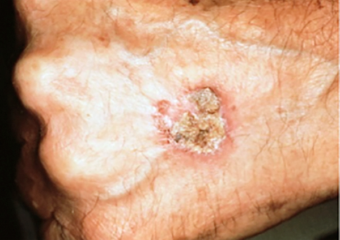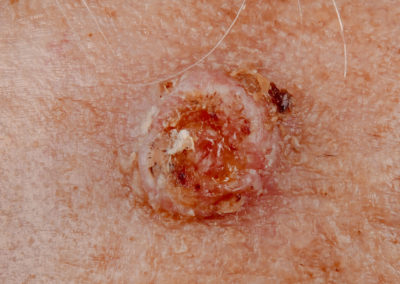SCCs
Squamous cell carcinoma (SCC) is a common type of keratinocyte cancer or non-melanoma skin cancer.
It is derived from cells within the epidermis that make keratin — the horny protein that makes up skin, hair and nails.
SCC can sometimes metastasise and may prove fatal.
What are the risk factors for SCC:
- Sex and age are important. Although they affect all adults they are more prevalent in elderly men.
- Previous SCC or another form of skin cancer is a strong predictor for further skin cancers.
- Actinic keratoses
- Smoking
- Blonde or red hair, blue or green eyes, fair skin
- Some Inherited syndromes such as xeroderma pigmentosum, albinism and epidermodysplasia verruciformis.
- Organ transplant recipients also have an increased risk.
- As do people exposed to ionising radiation, or arsenic
- Immune system suppression due to cancer, other disease or medications.
- SCCs are overwhelmingly linked to ultraviolet radiation (sunshine), with strong genetic underpinnings so sunscreen and sun protection is vital.
What are the symptoms of SCCs?
- Scaly crusty enlarging lumps that grow over weeks or months
- They may ulcerate
- They may bleed
- They are often painful
- Frequently they are located on face, lips, ears, hands, forearms and legs which are exposed to the sun
- Size varies from a few millimetres to several centimetres in diameter.
What is the treatment for SCCs?
Treatments for SCCs include:
- Excisional surgery
- Radiation therapy
- Mohs Surgery
- Topical Medications
- Cemiplimab which in Australia is only used in a provisional capacity for advanced and metastatic SCCs.
What is the outlook for SCCs?
- Most SCCs can be cured by treatment
- However, the risk of recurrence or disease-associated death is greater for tumours that are more than 20mm in diameter and or 2mm in thickness at surgical excision.*
- About 50% of people at high risk of SCC develop a second one within 5 years of the first.
- They are also at increased risk of other skin cancers, especially melanoma.
- Regular self-skin examinations and long-term annual skin checks by an experienced health professional are vital.
- Also ask your hairdresser/loved one to check your scalp with hair dryer on cool.
Find out in detail about our skin cancer treatments for BCCs, SCCs and melanoma here.



